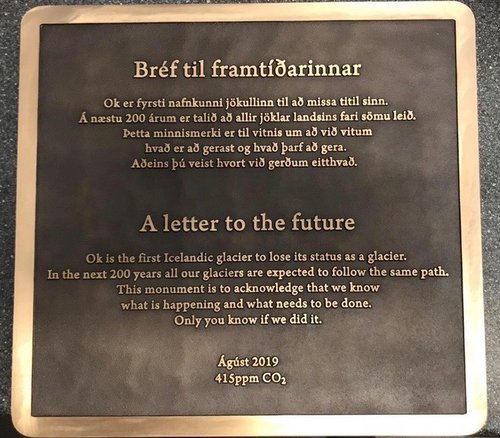For thousands of years, Okjökull glacier, also known as “Ok,” was tidily nestled in western Iceland’s tundra landscape in the town of Borgarfjörður.
But warming global temperatures reduced Ok to rock in 2014, creating the country’s first glacial casualty, according to Rice University.
Now scientists from Rice University have teamed up with the Icelandic Hiking Society to erect a plaque in Ok’s place. The plaque memorializes Ok, while warning of the relentless march of climate change.
"Ok is the first Icelandic glacier to lose it status as a glacier," the text of the plaque reads. "In the next 200 years all our glaciers are expected to follow the same path.
"This monument is to acknowledge that we know what is happening and what needs to be done," it says. "Only you know if we did it."

Like a tombstone, the plaque carries a dated inscription at the bottom that reads, “August 2019, 415 ppm CO2,” meaning there are 415 parts of carbon dioxide per million atmospheric particles, a level not seen in more than 3 million years. Scientists had long wanted to keep carbon dioxide particles to below 350 parts per million, but now it seems as if they will climb indefinitely.
The purpose of the plaque is to remind people that the world must take action to curb climate change, according to Rice University. Tourists who visit the popular hiking destination might read the plaque and be inspired to push world leaders to restrict greenhouse gas emissions.
Read More: 6 Ways the Melting Arctic Threatens the Planet
Either way, the plaque is a solitary protest against the status quo that allows greenhouse gas emissions to climb year after year.
"This will be the first monument to a glacier lost to climate change anywhere in the world," Dominic Boyer, an anthropologist with Rice University, said in a press release. "By marking Ok's passing, we hope to draw attention to what is being lost as Earth's glaciers expire.
“These bodies of ice are the largest freshwater reserves on the planet and frozen within them are histories of the atmosphere,” he added. “They are also often important cultural forms that are full of significance."
Warming global temperatures have been shrinking the world’s glaciers for the past few decades.
Iceland alone loses about 11 billion tons of ice annually. Antarctica, meanwhile, loses 252 gigatons of ice annually. Greenland’s ice sheets, which have lifted global sea levels by a quarter of an inch in just the past eight years, have lost 11 quadrillion tons of water.
Read More: This Striking Photo Reveals the Devastating Impact of Climate Change on Greenland’s Ice
As ice sheets and glaciers melt, they turn to darker water, which absorbs more sunlight, causing more melting, which can create a dangerous feedback loop.
By 2100, melting ice sheets could raise sea levels by several feet, enough to inundate coastal cities, submerge many island states, displace millions of people, and fundamentally alter the world’s climate system. Although the Ok glacier was tiny, scientists are hoping that its memorial will have enough of an impact to prevent that from happening.